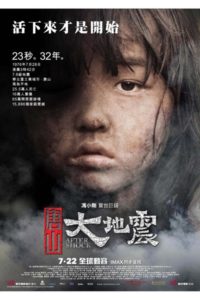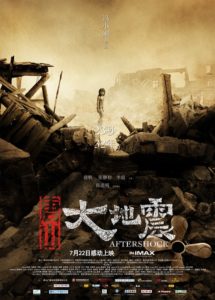Aftershock
唐山大地震
China/Hong Kong, 2010, colour, 2.35:1, 134 mins.
Director: Feng Xiaogang 冯小刚.
Rating: 7/10.
Long-limbed drama following survivors of the 1976 Tangshan earthquake is no simple tearjerker.
Tangshan, Hebei province, northeast China. Steel-rolling factory worker Fang Daqiang (Zhang Guoqiang) and his wife Li Yuanni (Xu Fan) have two children, six-year-old daughter Fang Deng (Zhang Zifeng) and her younger brother Fang Da (Zhang Jiajun). In the middle of the night of 27-28 July 1976, while the parents are making love in the back of a lorry, a powerful earthquake demolishes the city, and Fang Daqiang is killed trying to rescue the kids at home. When day dawns, Fang Deng and Fang Da are found trapped beneath some heavy masonry, and their mother has to decide which of the two to rescue. She chooses Fang Da, who survives but has his left arm amputated. Unknown to her mother, however, Fang Deng also survives, and when no one  claims her she is adopted by a childless PLA couple, Wang Deqing (Chen Daoming) and his doctor wife Dong Guilan (Chen Jin), who raise her under the name Wang Deng, nicknamed Yaya. Ten years later, Fang Da (Li Chen) is a restless teenager who doesn’t want to go to college, and finally leaves Tangshan to travel south to make a life of his own. Separately, Fang Deng (Zhang Jingchu), still suffering nightmares from her childhood trauma, also decides to go south, to study medicine in Hangzhou where, unknown to her, Fang Da is working as a pedicab driver. With Fang Da thinking his sister is long dead, and Fang Deng determined never to revisit Tangshan, the family remains unreunited. Then the 2008 Sichuan earthquake plays a fateful card.
claims her she is adopted by a childless PLA couple, Wang Deqing (Chen Daoming) and his doctor wife Dong Guilan (Chen Jin), who raise her under the name Wang Deng, nicknamed Yaya. Ten years later, Fang Da (Li Chen) is a restless teenager who doesn’t want to go to college, and finally leaves Tangshan to travel south to make a life of his own. Separately, Fang Deng (Zhang Jingchu), still suffering nightmares from her childhood trauma, also decides to go south, to study medicine in Hangzhou where, unknown to her, Fang Da is working as a pedicab driver. With Fang Da thinking his sister is long dead, and Fang Deng determined never to revisit Tangshan, the family remains unreunited. Then the 2008 Sichuan earthquake plays a fateful card.
REVIEW
Contrary to expectations and the pre-release hype, Aftershock 唐山大地震 is neither a CGI-heavy disaster epic nor a melodramatic wallow. The big wobbly of the film’s Chinese title (“Tangshan Earthquake”) comes 10 minutes into the movie and takes up only three minutes of screen time – making the movie’s release in China on some IMAX screens somewhat short-changing, to say the least – and for the rest of the two-plus hours is a standard drama about a family that is separated for decades by the tragedy. A more fitting title for the film would be Return to Tangshan, as the central drama revolves around the daughter’s refusal to go back home as she still feels traumatised by the knowledge that her mother chose her brother’s life over hers.
The original 2006 short novel by Chinese-born Canadian Zhang Ling 张翎 focused heavily on the daughter’s continuing psychological trauma and various misfortunes (including being sexually abused by her adoptive father) in the decades that followed the earthquake. The movie adaptation by Su Xiaowei 苏小卫 (a part-time censor at SARFT) throws out most of these dark, melodramatic elements in favour of a brighter, more hopeful tone, as well as making the daughter’s foster parents PLA soldiers and using the story as a de facto survey of China’s economic and social changes during the past 30-odd years. Though the movie is smoothly directed by box-office magician Feng Xiaogang 冯小刚 (The Banquet 夜宴, 2006; Assembly 集结号, 2007; If You Are the One 非诚勿扰, 2008), and well acted by the whole cast, it still has the slight feel of what it actually is – a movie commissioned from Feng in 2008 by Tangshan’s city government to commemorate the 32-year-old event in the light of the similarly tragic 2008 Sichuan earhquake. (The film’s coda features a real-life survivor, Song Shoushu 宋守术, at the Tangshan memorial wall listing the 240,000 victims’ names.)
Despite this, Su has done a generally fine job in her adaptation, keeping all three of the main characters in the mix throughout and making the family reunion the main emotional focus rather than just concentrating on the brother and sister whose paths fail to cross down in Hangzhou. (Original author Zhang was born in Zhejiang province, and her story is as much set there as in Tangshan up north.) The final reels, which normally would have been heavy with emotion and music, are very restrained, and even omit the reconciliation between sister and brother, cutting straight to the family‘s reunion back home.
The bulk of the acting is carried by Xu Fan 徐帆 (a regular in husband Feng’s movies) who convincingly ages across 32 years and is especially good in the middle section as a tart-tongued widow who remains stubbornly independent, even turning down the kindly advances of an electrician friend, played by Yang Lixin 杨立新. In the parallel southern scenes, Chen Daoming 陈道明 makes much of the foster-father role, a potentially cliched character who becomes especially believable in the second half. As the adult daughter, Zhang Jingchu 张静初 (The Road 芳香之旅, 2006) finally gets a meatier role again after more or less token parts in Hong Kong productions, and movingly handles a key scene in which she finally confesses to her foster father the real reason for not wanting to return to Tangshan.
The de facto survey of China’s modernisation is by now hardly original in Mainland Chinese cinema but it’s handled here in a subtler way, partly through changes in family attitudes and partly through discreet art direction and set decoration. Though the basic paragraphing of the story into four sections (1976, 1986, 1995, 2008) impedes the emotional development a little – though not half as much as in Feng’s similarly structured Assembly – the passage of time within the sections is seamless, and the last half-hour does carry a considerable emotional punch, despite a clunky English-dialogue sequence set in Vancouver. Visual effects for the actual earthquake do the job fine, and the widescreen photography by Lv Yue 吕乐 is always well appointed, with the desaturated look of the quake’s immediate aftermath recalling his early footage in Assembly.
One small continuity gaff comes near the end, where the dates on a gravestone don’t match with some information given in a previous dialogue scene between mother and daughter.
CREDITS
Presented by Tangshan Telebroadcast Media (CN), China Film Group (CN), Huayi Brothers Media (CN), Shanghai Film Group (CN), Zhejiang Audiovisual (CN), Media Asia Film (HK), Emperor Motion Pictures (HK). Produced by Huayi Brothers Media (CN).
Script: Su Xiaowei. Novel: Zhang Ling. Photography: Lv Yue. Editing: Xiao Yang. Music: Wang Liguang. Production design: Huo Tingxiao. Art direction: Zhao Bin. Costumes: Liu Xiaoli. Sound: Wu Jiang, Gim Seok-weon. Action: Bak Ju-cheon. Second-unit direction: Liu Mingzhe. Special effects: Jeong Do-an. Visual effects: Phil Jones, Jiang Yanming. Special effects make-up: Shin Jae-ho. Consultant: Zhao Yong.
Cast: Xu Fan (Li Yuanni), Zhang Jingchu (Fang Deng, her daughter), Li Chen (Fang Da, her son), Zhang Zifeng (young Fang Deng), Zhang Jiajun (young Fang Da), Zhang Guoqiang (Fang Daqiang, their father), Chen Daoming (Wang Deqing, Fang Deng’s foster father), Chen Jin (Dong Guilan, Fang Deng’s foster mother), Wang Ziwen (Xiaohe, Wang Da’s wife), Yang Lixin (Niu, electrician), Lv Zhong (Fang Daqiang’s mother), Yong Mei (Fang Daqiang’s sister), Liu Lili (Sichuan mother), Zhang Baowen (Wang Zhiguo’s wife), Ma Qiuzi (Zhao, director), Lv Jing (female teacher), Lu Yi (Yang Zhi, Fang Deng’s boyfriend), David F. Morris (Alexander, Fang Deng’s husband), Song Shoushu (himself).
Release: China, 22 Jul 2010; Hong Kong, 22 Jul 2010.
(Review originally published on Film Business Asia, 26 Aug 2010.)
